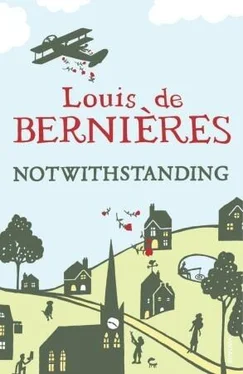Louis de Bernieres - Notwithstanding - Stories from an English Village
Здесь есть возможность читать онлайн «Louis de Bernieres - Notwithstanding - Stories from an English Village» весь текст электронной книги совершенно бесплатно (целиком полную версию без сокращений). В некоторых случаях можно слушать аудио, скачать через торрент в формате fb2 и присутствует краткое содержание. Год выпуска: 2010, Издательство: Vintage, Жанр: Современная проза, на английском языке. Описание произведения, (предисловие) а так же отзывы посетителей доступны на портале библиотеки ЛибКат.
- Название:Notwithstanding: Stories from an English Village
- Автор:
- Издательство:Vintage
- Жанр:
- Год:2010
- ISBN:нет данных
- Рейтинг книги:4 / 5. Голосов: 1
-
Избранное:Добавить в избранное
- Отзывы:
-
Ваша оценка:
- 80
- 1
- 2
- 3
- 4
- 5
Notwithstanding: Stories from an English Village: краткое содержание, описание и аннотация
Предлагаем к чтению аннотацию, описание, краткое содержание или предисловие (зависит от того, что написал сам автор книги «Notwithstanding: Stories from an English Village»). Если вы не нашли необходимую информацию о книге — напишите в комментариях, мы постараемся отыскать её.
is a funny and moving depiction of a charming vanished England.
Notwithstanding: Stories from an English Village — читать онлайн бесплатно полную книгу (весь текст) целиком
Ниже представлен текст книги, разбитый по страницам. Система сохранения места последней прочитанной страницы, позволяет с удобством читать онлайн бесплатно книгу «Notwithstanding: Stories from an English Village», без необходимости каждый раз заново искать на чём Вы остановились. Поставьте закладку, и сможете в любой момент перейти на страницу, на которой закончили чтение.
Интервал:
Закладка:
One day Uncle Dick was hiding in the ditch, watching Mr Chittock, when Lizzie turned up. She had spotted him somehow, even through the canopy of an oak tree, and she descended noisily on to his shoulder with a small cry of joy. Nowadays she often had a wild rook with her, who kept a safe distance, and this companion settled into the oak above to keep an eye on his betrothed. ‘Bugger off! Bugger off, Lizzie,’ whispered Uncle Dick, fearing discovery, and brushing her legs from beneath him to get her off his shoulder.
Lizzie protested, but took off into the hawthorn tree above the new green. There she sidled along the branch until she was a few feet away from Mr Chittock as he stood forlornly with his new shotgun, waiting for the moles. She examined him with interest, raising and lowering the feathers on the top of her head from the effort of concentration, and suddenly all those months of Uncle Dick’s assiduous elocution lessons paid off. In the latter’s unmistakable tones, she said, ‘Silly bugger.’
Royston Chittock looked up abruptly, and the bird repeated ‘Silly bugger’, fluttering her wings and bobbing her tail on account of the extreme intellectual effort.
Chittock, his heart so full of rage and frustration that he had to take it out on something, raised the new gun, and fired. Nothing happened because he had forgotten to slip the safety catch. No animal likes to have even a stick pointed at it, so Lizzie skipped to another branch and craned her head in agitation. Chittock slipped the safety catch, and fired again, almost at point-blank.
He had not expected the kick to be so great, and, because the gun had been badly seated in his shoulder, he bruised his cheekbone on the stock. Holding the gun in his left hand, and with his right to his cheek, he looked down at the dying bird, its beak opening and closing, its scarlet blood darkening on the fine grass, its body almost shredded because of the close range of the shot. He was quite unprepared for Uncle Dick’s bursting through the hedge like a berserker.
Mr Royston Chittock sold his new shotgun and his house with its immaculate green, and moved back to Putney, where he continued to play below his handicap at Wimbledon Park, and the Duke’s and Prince’s Course at Richmond. He tried to forget the humiliation and ridicule that he had incurred in Notwithstanding, as Uncle Dick had denounced him, called him every foul name he could think of, and informed him that there hadn’t been any moles and they’d just been paying him back for being a stuck-up stupid thieving bastard. The interview had ended with Chittock on his hands and knees, as Uncle Dick’s hand clamped the back of his neck and his face was rubbed back and forth in the blood on the green. Then Uncle Dick had picked up the shotgun and fired the second barrel into the beautiful turf, saying, ‘Repair it yourself, pillock.’
He wrapped Lizzie’s mangled body in a piece of sacking from the back of his Prefect, took it away and buried it sadly on the golf course. He wished he had been able to tell Robert the circumstances of her wonderful linguistic advance, but he judged it better to keep silence and let the youngster think that she had simply disappeared, because birds are like women, and that’s what birds inevitably do.
THE BROKEN HEART

‘THE THING IS, Mr Oak, that there’s so much new money splashing about these days.’
‘New money? What’s that then? What’s new about it?’ Obadiah ‘Jack’ Oak hawks up a good gobbet of phlegm, curls his tongue into a blowpipe and ejects it. The projectile describes a graceful arc into the fireplace, where it comes to lie, shining and frothy, on the bed of ash. The young man winces. ‘Well, there are lots of people who have money now who never had it before, and lots of people who did have money who now have so much that they’re just looking desperately for things to spend it on. To invest in. Fine wines, or classic cars for example. That Triumph Herald of yours is probably worth more than a thousand just now.’
‘Got it for fifty pound,’ says Jack. ‘It’s clapped out, that is. Not worth nothing.’
‘Believe me, there are people who’ll pay a thousand.’
‘They’re mad, then,’ replies Jack. Jack has the peasant’s natural reservations about young smart alecs. This one can’t be more than twenty-two years old, he has a new suit, shiny shoes, an elegant haircut, and his hands and nails are so clean that Jack suspects him of being ‘you know, like, one o’ them, like that’, which is his way of saying a homosexual. He also has the accent of someone trying to appear posher than he is. Jack is suspicious of anyone who aims above his station. He has been obdurately and solidly himself since he was young, and cannot conceive of either wanting or trying to become someone else. ‘So what are you then?’ Jack asks again.
‘An estate agent,’ repeats the youngster. ‘I work for Slipsters in Haslemere, and I help arrange the sale of properties.’
‘An’ you say someone’s offrin’ two hundred thousand for this?’ He looks around his living room, at the flaked and mottled paint, the nicotine-stained ceiling, the missing floorboard and the cobwebbed, rotted window frames. ‘They’re mad then.’ A new suspicion strikes him. ‘Are you ’avin’ me on?’
‘No, Mr Oak.’ The young man tries to look suitably grave and trustworthy.
Jack Oak furrows his brow and says, ‘But I never said this place was for sale.’
‘As I explained, Mr Oak, my client saw this house and enquired about its status at the village shop. I mean no offence, but he thought it might have been abandoned. He asked me to approach you and offer you two hundred thousand for it, in case you should consider selling. I know this is a somewhat unusual way of doing things, but he does like it very much.’
‘He likes it two hundred thousand’s worth,’ observes Jack Oak.
It is the late 1980s and Mrs Thatcher has changed the entire consciousness of the country. She has profoundly inconvenienced and confounded the left by winning a popular war against a fascist government. An energised Great Britain has finally come to understand that it is not high talk but money that makes all things possible. Bright young people are making fortunes in the City, and are not ashamed to be thought vulgar or greedy. People who used to put their money in the post office are speculating boldly. The trade unions are rapidly declining. The government is beginning to rake in wonderful tax returns while lowering the rate. The word ‘yuppie’ has come into common currency, and people are playing with other acronyms. The present favourites are ‘dinky’, which means ‘double income, no kids’, and ‘lombard’, which means ‘lots of money but a real dick’. Socialism is about to be reborn as conservatism with a winsome smile.
The property-owning democracy is on its way, and the estate agent from Slipsters in Haslemere has pointed out to Jack Oak that just now all the money is going into houses. The prices have rocketed, most particularly in London, and in the south, in those places that are on the commuter routes. Commentators talk of the phenomenon in tones that clearly imply that there is a strong element of insanity in it all. Some Jeremiahs are seeing lemmings everywhere, and predicting a crash. Some people on low fixed incomes are realising that they will never be able to buy. In the countryside young people cannot buy houses in their native villages because weekenders are putting the prices out of reach, and they are leaving for rented accommodation in towns. Village shops and post offices are losing their weekday clientele and closing down. The social fabric of the countryside is distorting. Some people who cannot afford mortgages are buying houses anyway, on the gamble that they’ll recoup their outlay many times over when they sell, and now someone wants to buy Jack Oak’s cottage, because it is ideally situated on the cricket green of a marvellously pretty village on the Portsmouth line to London. It will be fabulous for weekends, it only needs stripping out completely, and a new roof, and an indoor lavatory and a bathroom, and one day it can be resold at a substantial profit, if only Jack Oak will sell. Ever since old Walter died, Jack has been the village’s last peasant, with his lips like kippers, his thick yellow nails, his rolling Surrey accent, his aroma of a thousand types of rustic decay and his eyes as round as dinner plates. He is the seventh generation of his family to occupy the little house on the green, and his daughter, Jessie, is the eighth.
Читать дальшеИнтервал:
Закладка:
Похожие книги на «Notwithstanding: Stories from an English Village»
Представляем Вашему вниманию похожие книги на «Notwithstanding: Stories from an English Village» списком для выбора. Мы отобрали схожую по названию и смыслу литературу в надежде предоставить читателям больше вариантов отыскать новые, интересные, ещё непрочитанные произведения.
Обсуждение, отзывы о книге «Notwithstanding: Stories from an English Village» и просто собственные мнения читателей. Оставьте ваши комментарии, напишите, что Вы думаете о произведении, его смысле или главных героях. Укажите что конкретно понравилось, а что нет, и почему Вы так считаете.












